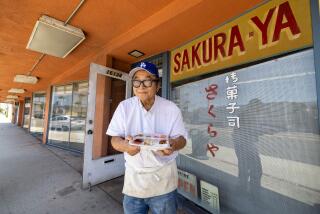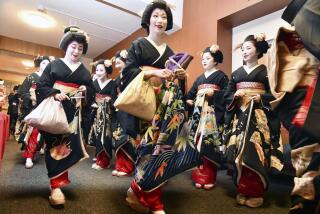The Pacific : <i> Chindonya </i> Take Marketing Back to the Future : Japan: The versatile street performers give recession-battered businesses a simple, inexpensive way to advertise.
- Share via
TOKYO — Japan’s big advertising agencies are being hammered by the recession. But Kanji Oi smiles behind his gaudy makeup and samurai wig. He has no shortage of customers.
Oi, a 77-year-old chindonya, or traditional vaudeville-type advertiser, says his troupe is so heavily booked he sometimes can’t take a day off.
Not so long ago, chindonya were practically social outcasts. Now they’ve become chic. Their inexpensive street art is the perfect advertising medium for recession-battered businesses trying to get by on limited marketing budgets.
One recent weekday found Oi performing at a food fair sponsored by a department store in Tokyo’s bustling shopping and entertainment district of Shinjuku.
Oi, wearing a short black-and-white plaid kimono and knee-length trousers, started playing his custom-made instruments: drums and a gong-like bell tied to a red umbrella. Immediately, a crowd--businessmen in suits, young mothers with children--surrounded his group. Onlookers broke into smiles.
“Welcome, welcome, welcome,” Oi cried in his rhythmic chant, or chindon. “Have fun as you shop. Which floor? Oh, yes, eighth floor. Don’t miss it, everyone!”
Mineo Tokoro, wearing a samurai wig, joined Oi, playing old-fashioned Japanese tunes on a clarinet. Meanwhile, his wife, Satoko, graceful in lavish geisha garb, played the drum. Two other men in subdued kimonos danced behind the musicians, waving placards.
The success Oi and his troupe are enjoying stands in sharp contrast to the hard times the big advertising agencies are weathering.
In the fiscal year that ended March 31, 1993--the latest for which figures are available--Japan’s largest ad agency, Dentsu, reported a $180-million decline in operating profits.
That’s down from $331.7 billion a year earlier.
Dentsu blamed the recession for the decline in advertising spending by companies and government offices.
Hiroshi Matsuzaki, Dentsu’s TV commercial director, says in such times simple advertising can be more effective.
“Viewers sometimes react negatively to commercials featuring foreign personalities or scenes because they seem excessively extravagant,” Matsuzaki says.
For the chindonya, the surge in their popularity represents a big comeback.
In the 1950s, there were more than 2,000 chindonya performers in Tokyo alone. But in the 1960s, as magazine and television advertising expanded, they all but disappeared. Only about 50 were left by the 1990s, performing mainly for pinball parlors.
In the past few years, however, organizers have begun hiring them for everything from food fairs to wedding parties, and young people have begun showing an interest in joining chindonya troupes, says Hisashige Kaneko, an event promoter.
Like Oi’s troupe, most chindonya work in groups of at least three, portraying set characters: a man in samurai garb with a drum and gong-like bell on his chest; a woman with a geisha wig plucking shamisen, a banjo-like instrument, and sometimes handing out leaflets, and a sax or clarinet player.
A group is paid an average of about $950, plus transportation and a meal, for a one-day performance. Chindonya usually start in front of a shop and tour the neighborhood, performing as they go.
“One must hire at least 10 ordinary entertainers for the same effect that one chindonya group can offer,” says Kaneko. “They charge smaller fees, but they’ve got everything--makeup, costumes and entertainment skills.”
The performances are also seen as a good-luck ritual, says Kazuo Naito, a chindonya who plays alto sax and clarinet.
“People hire us for themselves, to regain good spirit and prosperity, and be happy.”
*
The chindon tradition began in the early 1920s, drawing from the traditions of the 300-year-old Kabuki theater and from wandering theatrical troupes.
It wasn’t a highly respected profession. Oi had a chindon- steeped childhood. His mother was a performer, and by age 14, Oi had his own troupe.
“I hated it first. . . . But now I can’t think of any other job better than chindonya, “ Oi says.
More to Read
Sign up for Essential California
The most important California stories and recommendations in your inbox every morning.
You may occasionally receive promotional content from the Los Angeles Times.










